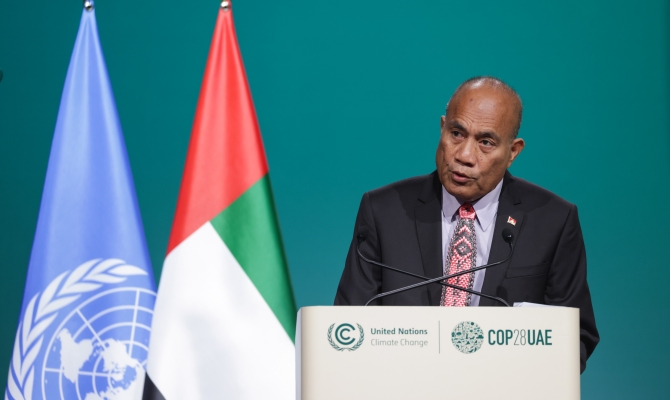
A low-lying atoll, the Kiribati suffers from the impacts of climate change with rising sea levels having caused increased coastal erosion and saltwater intrusion in the freshwater lens. Source: SPREP
9 December 20203, UAE – Kiribati called upon world leaders to keep on track for our future generations at the UN Climate Change Conference today. A low-lying atoll, the island nation suffers from the impacts of climate change with rising sea levels having caused increased coastal erosion and saltwater intrusion in the freshwater lens.
With climate change impacts greatly affecting the lives of families on Kiribati, it was an impassioned plea that saw Kiribati President H.D Tanete Maamau remind all world leaders and over 190 parties that this conference must prioritise the phasing out of fossil fuels to align with a 1.5 degrees Celsius pathway, and peaking emissions by 2025.
The 28th Conference of the Parties to the UN Framework Convention on Climate Change in the UAE resumed its high-level segment today which saw Kiribati address over 100 world leaders and ministers as the first speaker.
“As we gather for this crucial high-level session, the urgency of our mission cannot be overstated. Recent extreme weather events jeopardise the security and well-being of our youth. Kiribati’s vision for 20 years charts a course toward a brighter future for our young generation,” presented H.E Taneti Maamau, President of Kiribati.
“As world leaders, our capacity to enhance the health, well-being and safety of our youth is far from our reach. Safeguarding their prospects through the availability of essential goods and services cannot be realised without political commitment.”
Science has indicated that current global commitments by countries to reduce greenhouse gas emissions under the Paris Agreement will not achieve the promise of 1.5 degrees Celsius, leading to higher global temperatures instead.
The overarching goal of the Paris Agreement, a legally binding international treaty on climate change is to hold the increase in global temperature to well become 2 degrees Celsius above pre-industrial levels and to pursue efforts to limit the temperature increase to 1.5 degrees Celsius above pre-industrial levels.
For the Pacific Islands as with all Small Islands Developing States, the strong call for 1.5 to stay alive has not dimmed. Nationally Determined Contributions which map the commitments by Parties to reduce their greenhouse gas emissions must be more ambitious, as with all climate change actions.
“These reports demand of us a robust and ambitious global stocktake outcome to course correct. It compels developed countries to just transition, increase finance and technical support taking into consideration the special circumstances of the most vulnerable, Small Island Development States,” said H.E Maamau.
He also congratulated the work of the President of the 28th Conference of the Parties to the UN Framework Convention on Climate Change for their work in securing pledges for the Loss and Damage Fund on Day one. He further highlighted the need for the continued capitalisation of the Fund and encouraged its swift operationalisation and simplified accessibility.
Yet his final words to the global community echoed the concerns for the lives, and way of life, of our future generations.
“I strongly urge my fellow leaders to place youth at the forefront of our decisions so we can build a resilient, prosperous and sustainable future for them and the entire humanity.”
Source: SPREP





